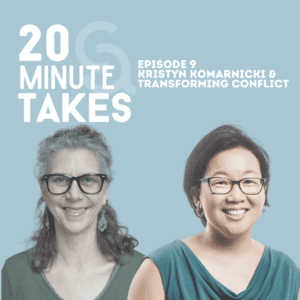 How can we pursue good for our siblings in Christ when their convictions clash with ours?
How can we pursue good for our siblings in Christ when their convictions clash with ours?
We increasingly live in a world where people—even fellow Christians—disagree about what is good, what makes for shalom. As we live in the trenches of daily life, Jesus calls us to love people with whom we deeply disagree. In my own friendships, nothing has been more difficult than actively pursuing the well-being of another when my own imagination of what constitutes abundant life contrasts with that person’s. How do we love well in this arena of competing visions of the good?[1]
Every person has a vision of the abundant life, whether or not they can articulate it. We are inescapably oriented toward our imagination of human flourishing.[2] I want to suggest that, despite our many differences, the basic Christian perspective on human flourishing has three parts:[3]
- Living in the presence and provision of God who is our Good Shepherd. The classic statement of this is Psalm 23, which shapes our image of God as a loving protector who leads through loss and death into restoration and abundant life.
- Seeking the righteousness of God, in partnership with God. The word Jesus uses in Matthew 6:33, dikaiosune, is difficult to translate. It points to character that makes us a blessing to others—justice hand-in-hand with mercy. Here we are thinking about agape, the settled disposition to act creatively for the flourishing of others. Our creativity (work), vocation, and sense of meaningful purpose are intertwined here with finding what God is up to in the world and joining him in it.
- Practicing contentment with the relational and material goods provided by God. As the New Testament repeatedly suggests, contentment is a deep need of the human soul. This element of the flourishing life introduces discipline—the ability to live well with our desire, and to cultivate gratitude and joy even in the face of deprivation.
These three elements are interdependent. Our image of God informs our vision of his kind of goodness, and our ability to practice joy enables (or hinders) our creative self-offering.
Now, here is the difficult reality: On any of these three elements, Christians may disagree. Our images of God might differ. We may have differing conceptions of justice and rightness. And we may vastly diverge on our definition of “goods.”
How then are we to seek the flourishing of others whose idea of flourishing is not the same as our own?
At the start, we must acknowledge that coercive tactics do not work. There is a deep temptation in disagreement to try to force another’s hand, which often takes the form of threatening to end the relationship. But these approaches withhold the relational dignity bestowed when we respect the other’s search for truth.
In my own journey, a very close friend of mine told me he wasn’t sure he could continue our friendship if I embraced my sexual orientation. That was a very deep blow for two reasons. First, it moved us from conversation as peers into the realm adversarial opposition. Second, though I couldn’t articulate it at the time, this response robbed me of the dignity of a genuine struggle to find truth. Using coercive relational tactics is a vote of no-confidence in the other’s ability to discern the will of God, and reduces them from an equal partner in our common quest for truth to a dependent status.
If we desire to refrain from coercion, and want to seek real goods for those with whom we disagree, I believe we have several important avenues available to us. These are ways to offer common goods while still disagreeing about what may be ultimately good.
- Offer a genuine willingness to hear and honor the other’s seeking after the good (shalom). In our conversations, despite disagreement, we can recognize and honor the deep longing in the other to find abundant life. Very seldom (if ever) will you find someone who actually does not care to find what is true and good, even if they refuse to use those words themselves. When we listen to each other and commend the struggle to find true human flourishing, we maintain level ground with the other and bestow the dignity of shared life on them. Over the a three year period, my weekly small group walked alongside me as I struggled to understand what God’s will was for me as a gay man. Though few of them changed their theological positions, at every step they honored me for trying my best to discern God’s will. They may think I have come to a flawed conclusion, but they treat me as a meaningful, thoughtful conversation partner, and that is a gift I treasure.
- Offer your creative effort to protect and secure whatever actual goods you can for the other, including your own presence and abilities. We should acknowledge that the other belongs to the “common-weal”—they are neighbors who depend on our gifting and abilities to flourish, interconnected in our communities. By simply offering them what you do well, you establish their place in the wider network of human lives. This is why I find the debate over baking cakes for gay weddings so disheartening. Christian bakers should realize that, for the most part, their cake may be the only creative opportunity they have to bless tangibly these human beings who happen to be gay. At present, they have no other door into their lives except by receiving them into the common-wealth by offering their creative service. This is not a moment to soapbox about rights; it is a precious bridge to extend dignity and belonging to those who are unlike you. Take every chance to offer meaningful blessing with the abilities God has given you, and then you can have a conversation about your differing beliefs.
- Offer the genuine honor of sharing your vision of abundant life in relational and vulnerable ways. This last point is crucial—and also must follow the other two. Once you have heard and honored, and tangibly cared for real needs, you have now established the context for relationship. But it will not be actual relationship until you show up with your whole self. That means offering your beliefs humbly, knowing that you may be rejected and spurned for them. If, however, we withhold our true thoughts, we again treat the other with less than full dignity. In this world of competing goods, true relationship means extending the other the courtesy of being able to disagree. We do this by acknowledging their views, sharing our own, and remaining in relationship.
None of this is easy. It takes strong character to submit ourselves to the process of honoring, caring and disagreeing in love. Most of all, it requires that we entrust the other person to God. We are not ultimately responsible for them or their choices; we can let ourselves off the hook when it comes to their decisions and lives. Instead, we hope in God’s ability to do more than we can ask or imagine, and offer ourselves to the other as friends, allies, peers and common members (community) in our search for abundant life.
Ben Barczi served as Pastor of Spiritual Formation for over a decade at First Baptist Church, San Luis Obipso, CA. A graduate of the Renovaré Institute for Spiritual Formation, he is now a spiritual director, M.Div student at George Fox Evangelical Seminary, and lives in Portland, Oregon with his virtuous dog, Arete. He also serves as a spiritual director for CSA’s Oriented to Love program.
Endnotes:
[1] Alasdair MacIntyre writes extensively about this situation in his book Whose Justice? Which Rationality? (South Bend: University of Notre Dame Press, 1989).
[2] See James K.A. Smith, Desiring the Kingdom (Grand Rapids: Baker Academic, 2009).
[3] This vision of the good is elaborated by Dallas Willard and Gary Black in their book, The Divine Conspiracy Continued (New York: HarperOne, 2014).


